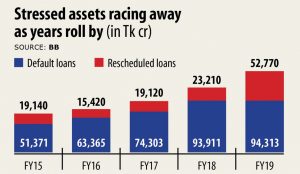Banks stressed assets not published in Bangladesh

1 crore (cr) = 10 million – BDT 96.91 = 1 EUR
The central bank of Bangladesh, the Bangladesh Bank (BB) skipped publishing the figure of stressed assets in it’s annual financial stability report first time with a view to painting a rosy picture of the banking sector at a time when lenders are facing one of their worst crises in living memory.
This may create a confidence crisis among investors and commoners in the financial sector as they would be completely in the dark about the true financial strength of banks.
The BB unveiled the Financial Stability Report 2019 on July 1 and it did not include the data on the stressed assets for the first time. Stressed assets, which include default loans, restructured and rescheduled advances, shot up 18.89 per cent to BDT 222,162 crore in the first half of 2019, central bank data showed. The ratio of stressed assets in the banking sector was 22 per cent of total loans as of June last year, up 16.10 per cent from four and a half years earlier.
Against the backdrop, the higher-ups of the central bank asked the related department, which is dedicated to preparing the financial stability report, not to release the figure, a senior official of the central bank told the Daily Star newspaper.
The central bank is now trying to paint an artificial picture of the banking sector, which will not bring any good for the economy, said Zahid Hussain, a former lead economist of the World Bank’s Dhaka office.
“Camouflaging the figure will give a wrong signal to the country’s financial sector.”
The central bank should follow international best practices to run its procedure to help the sector recover quickly from the financial meltdown, said Ahsan H Mansur, executive director of the Policy Research Institute of Bangladesh, a think-tank. “But the financial regulator has taken a wrong path to address the issue. Both investors and researchers could examine the actual situation of the banking sector if the central bank continued to release the data,” he said.
The data of stressed assets is highly important to verify the genuine loss of the financial sector during the post-pandemic period, said Mansur, also a former official of the International Monetary Fund (IMF).
Asked why the central bank stopped releasing the stressed asset figure, it’s Spokesperson Md Serajul Islam advised talking to the officials of the Financial Stability Department. The officials of the department argued that only India was calculating the stressed assets, so the central bank stopped to prepare the data.
The central bank has been releasing the data on stressed assets annually for many years and it helps local and foreign think-tanks and multilateral lenders assess the banking sector better. The IMF and other multilateral lenders and donor agencies have taken into account the figure while assessing the economy.
The stressed assets rose to a great extent last year as banks rescheduled defaulted loans on a wholesale basis. Last year, defaulted loans amounting to BDT 52,770 crore were regularised, the highest for a single year, according to BB data. The record amount of rescheduled loans has widened the volume of stressed assets.
Defaulted loans would have increased alarmingly if the central bank had not taken a relaxed rescheduling policy, bypassing its own rules and regulations.
At the end of 2019, defaulted loans hit BDT 94,313 crore, up 0.42 per cent year-on-year.
Such risky assets can put an adverse effect on banks’ balance sheets and profitability because of the need for provisioning against the classified loans and reduced returns on investment, according to a recent central bank report on stressed assets. They also push up the cost of capital, widen assets and liability imbalance and upset the economic value added by banks. Considering the effect that it has on both capital and liquidity position of banks, it may turn into a financial stability threat if it remains unaddressed, the Financial Stability Report said.
The IMF recently said the BB would need to monitor closely banking sector conditions given the elevated level of default loans. Controlling stressed assets of the banking sector will be imperative with banks bearing the entire credit risk for the stimulus package routed through banks, it said.
The BB would implement a major portion of BDT 103,117 crore stimulus packages unveiled by the government to keep the battered economy on track and business, industries and farmers withstand the impacts of the coronavirus pandemic.
According to Mansur, the country’s banking sector will face deep trouble in the days ahead due to the ongoing economic fallout brought on by the coronavirus pandemic. Most banks’ operating profits declined 20 to 30 per cent in the first half of 2020 because of the paralysed economy, giving the idea of how the sector is faring amid the pandemic.
Default loans are supposed to go down significantly until at least the end of September as the central bank asked banks not to classify any loans to protect borrowers from the ongoing recession. The BB asked lenders to retain the same credit status of a borrower until September that they had in January. Default loans may go up after the third quarter due to the ongoing economic fallout.
